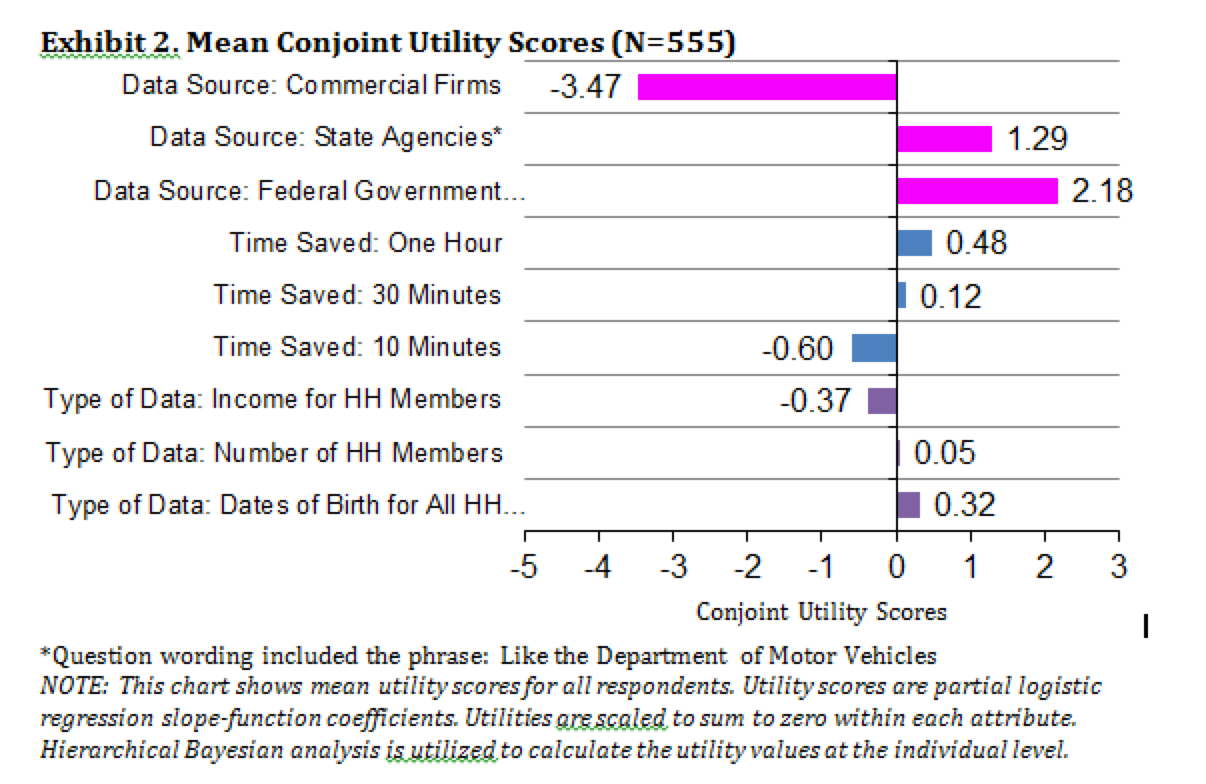Census Research Methodology Experiment
Generic Clearance for the Collection of Qualitative Feedback on Agency Service Delivery
OMBConjoint_Replicate
Census Research Methodology Experiment
OMB: 0690-0030
The Census Bureau plans to conduct new research under Generic Clearance. The Census Bureau is exploring the strategic re-use of administrative data from federal, state, and commercial providers. The use of administrative records data has proven to make operations more efficient, improve data quality, reduce data collection and processing costs, and reduce participant burden. Through record linkage and statistical matching, we enhance Census Bureau operations and extend demographic and socioeconomic research capabilities. This research follows on a conjoint study conducted last year. This study seeks to replicate findings from that study using a traditional experimental design.
The conjoint study provided objective, quantitative measures called “utility scores” that measure the value of features (levels of attributes). These scores were statistically derived from the choices that respondents made when asked to trade off features (often including price) against each other. Price is defined as what the respondent must pay to get valued features and is not necessarily monetary. In this case, price was the respondent’s time, as measured by burden. In the conjoint study, we examined preferences for the use of administrative records with regard to privacy and burden on the public’s time. Table 1 shows the attributes and levels of the attributes that were varied during the study.
Attribute |
Level 1 |
Level 2 |
Level 3 |
Time saved by using outside data |
10 Minutes |
30 Minutes |
One hour |
What outside data we use
|
Number of Household Members |
Household Income |
Medical Information |
Outside data source |
Government Agencies |
The Internet |
Private Companies |
Table 1. Attributes and Levels for Study #1
Figure 1 shows the results from the conjoint study.

Figure 1. Results from Conjoint Study.
In the current study attempting to replicate the conjoint study, staff from the Center for Survey Measurement (CSM) will sample 13500 email addresses from people who have opted-in to help conduct research for the Census Bureau and will email them an invitation to complete an online survey. We expect to achieve a 10% response rate, in accordance with recent studies, with a goal of 50 completes in each panel. This is the sample size needed to detect a 1% difference between panels with 95% confidence. CSM staff will send the emails through GovDelivery. Up to two reminder emails will be send to email addresses not associated with a survey response. Data will be collected on the Survey Monkey platform (no PII will be requested).
This is a between-subjects study design with twenty-seven conditions, corresponding to the variables presented above with the conjoint study.
We estimate that potential respondents will spend approximately 2 minutes reading emails (if every person sampled reads the emails, it will be 2 minutes times 13,500 emails, totaling 450 hours) and each respondent will spend approximately 5 minutes on average completing the survey (5 minutes times 1350 respondents totals 112.5 hours) and. Thus, the total maximum respondent burden for 1350 completes for this study is 562.5 hours.
|
# of Participants Screened |
Minutes per participant for Screening |
Total Screening Burden |
Maximum number of Participants |
Minutes per participant for data collection |
Total Collection Burden |
Total Maximum Burden (Screening + Collection) |
Online data collection: Survey Monkey |
13,500 |
2 |
450 hours |
1350 |
5 |
112.5 hours |
562.5 hours |
The contact person for questions regarding data collection and statistical aspects of the design of this research is listed below:
Jennifer Childs
Center for Survey Measurement
U.S. Census Bureau
Washington, D.C. 20233
(304) 728-4932
Jennifer.hunter.childs@census.gov
| File Type | application/msword |
| File Title | The purpose of this letter is to inform you of our plans to conduct research under the generic clearance for questionnaire pre |
| Author | Bureau Of The Census |
| Last Modified By | Dumas, Sheleen (Federal) |
| File Modified | 2016-09-21 |
| File Created | 2016-09-21 |
© 2026 OMB.report | Privacy Policy